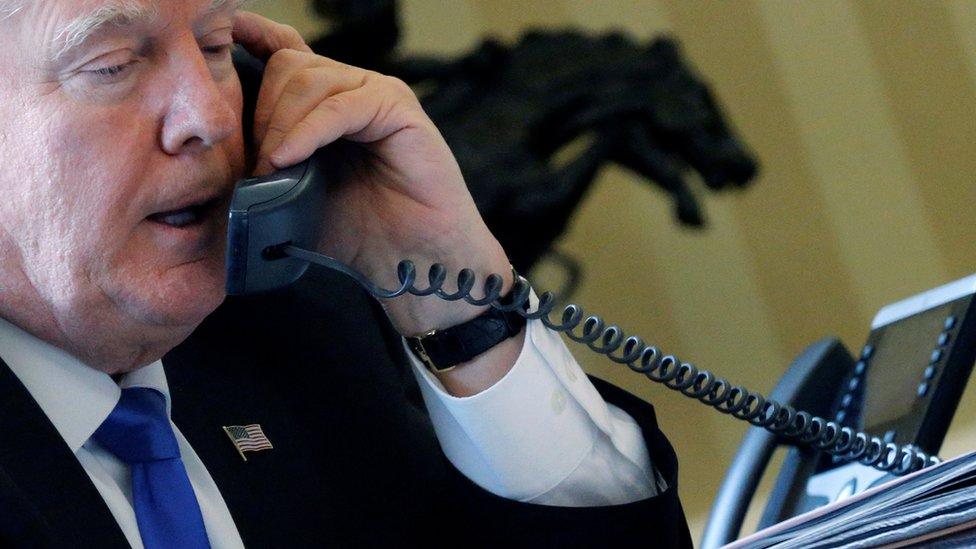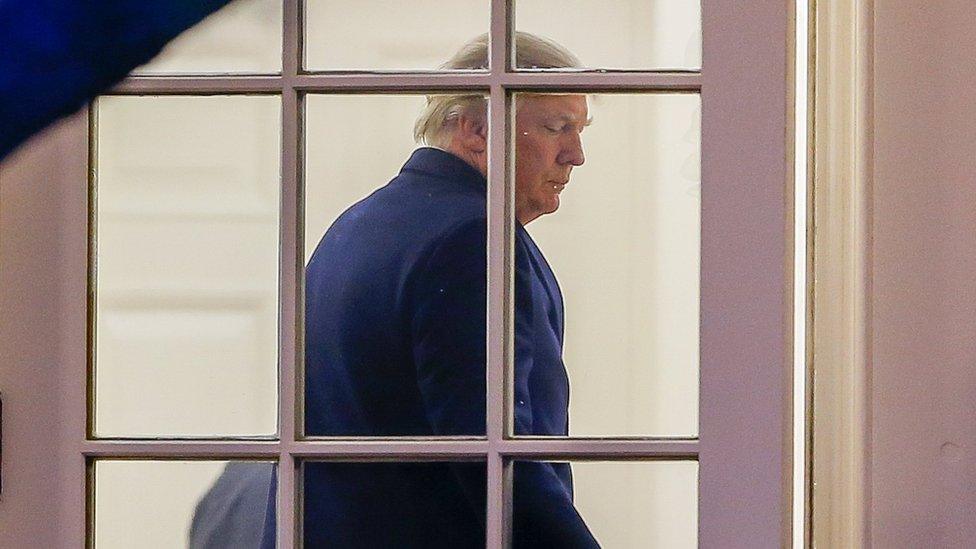Trump wiretap: FBI chief Comey 'rejects' allegation
- Published

The allegation relates to the presidential race last year
FBI director James Comey has rejected Donald Trump's claim that his predecessor, Barack Obama, ordered a wiretap of his phone before he was elected US president, US media say.
Mr Comey reportedly asked the US justice department (DOJ) to publicly reject Saturday's allegation, according to the New York Times and NBC.
He is said to have asked for this because the allegation implies the FBI broke the law.
The DOJ has not commented.
US media quoted officials as saying that Mr Comey believed there was no evidence to support Mr Trump's allegation.
From an FBI director this is a startling rebuke of a sitting president and Mr Comey will be under pressure from Democrats to voice it publicly, the BBC's Nick Bryant reports from Washington.
What did Trump allege?
The Republican president, who faces intense scrutiny over alleged Russian interference in support of his presidential bid, made the claims in a series of tweets on Saturday.
He offered no evidence to support his allegation that phones at Trump Tower were tapped last year.
His tweets followed allegations made by conservative radio host Mark Levin, including that the Obama administration "sought, and eventually obtained, authorisation to eavesdrop" on the Trump campaign last year.
White House press secretary Sean Spicer went on to say there had been "very troubling" reports "concerning potentially politically motivated investigations immediately ahead of the 2016 election".
Did Obama really order a wiretap?
James Clapper says he "can deny" that Donald Trump's phones were tapped
A US president cannot legally order the wiretapping of a US citizen.
But his Justice Department can apply to federal judges for wiretaps, citing suspected serious criminal activity or a threat to national security.
Notably, the former president's statement of denial only says neither Mr Obama nor the White House ordered a federal wiretap of a US citizen.
It does not say such a wiretap did not exist.
A warrant, if it existed, would most likely have been applied for by the FBI or a US intelligence agency independently of the White House.
If it is a national security issue, the wiretap must be approved at the highest levels of the Justice Department before being submitted for approval to the US Foreign Intelligence Surveillance Court.
What is the reaction - and what happens next?
Leading Democrats have called on the White House to produce evidence to support Mr Trump's claim.

Mr Trump arrived back at the White House on Sunday after spending the weekend at his Florida resort
Meanwhile, the White House has called on Congress to investigate whether the Obama administration had abused its powers.
Both Congress and the FBI are currently investigating contacts between the Trump election campaign and Russian officials, after US intelligence agencies assessed that Russia had interfered with the election to help Mr Trump win against his Democratic opponent, Hillary Clinton.
Why is Watergate in the news again?
What Trump has achieved so far
Representative Devin Nunes, the Republican chairman of the House Intelligence Committee, said in a statement that his committee would "make inquiries into whether the government was conducting surveillance activities on any political party's campaign officials or surrogates".
Senate Intelligence Committee Chairman Richard Burr, also a Republican, said in a statement that the inquiry would "follow the evidence where it leads, and we will continue to be guided by the intelligence and facts as we compile our findings".
Mr Trump, who spent the weekend at his Florida resort, called the alleged tapping "Nixon/Watergate", referring to the notorious political scandal of 1972, which led to the downfall of President Richard Nixon.
He asked on Twitter whether it was legal for a "sitting president to be wire-tapping" and referred to the allegation as "a new low".
Earlier, Ben Rhodes, who was Mr Obama's foreign policy adviser and speechwriter, wrote in a tweet: "No President can order a wiretap. Those restrictions were put in place to protect citizens from people like you."